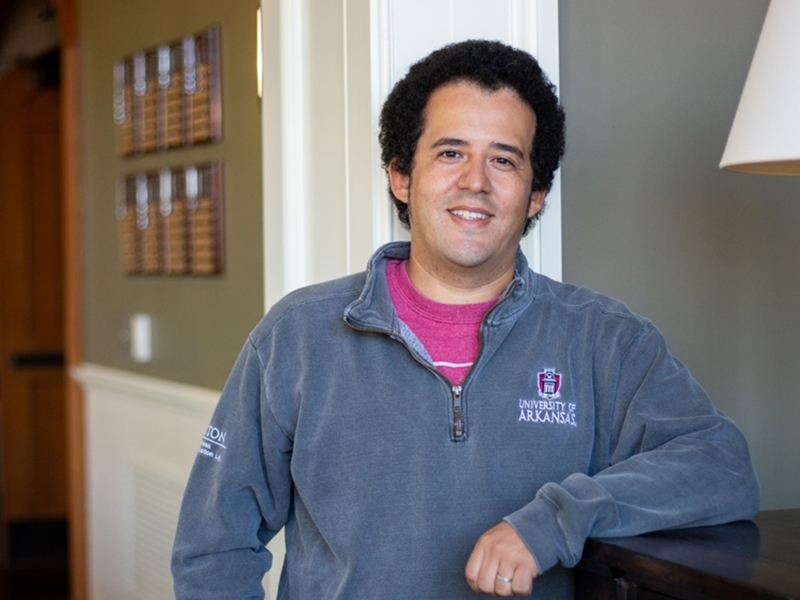Graduate and international education is all about discoveries — the discovery of knowledge, the discovery of research and creative scholarship that improves lives and the discovery of new countries, cultures and people. The Graduate School and International Education is celebrating our students, faculty and staff that make discoveries happen at the U of A.
The COVID-19 pandemic may have disrupted many aspects of U of A graduate student Guillermo Pernet's life, but it also set him on a new track in his academic research.
As a fluent speaker of Spanish, English and French, Pernet had initially planned to study comparative literature with a focus on foreign languages and digital humanities. But when the pandemic closed down much of the physical operations across campus, Pernet found himself interested in a new medium: maps.
"Everything was closed, so the only collections available were digitized maps at places such as Gallica," he said. "So, I started playing around with them, looking at what they were and listening to people discuss them over Zoom."
Using the University Library's interlibrary loan service, Pernet began examining books, maps and illustrations from the 17th and 18th centuries to explore the portrayal of various cultures and lands during the colonial expansions of that time period, specifically focusing on Venezuela and Louisiana. He discovered an opportunity to fuse the three sources together to form a comprehensive picture of travel accounts from that period by analyzing the topographic, textual and visual information about a place and connecting that information to its history, memories and myths.
"Think about it as a colonial meme," he said. "With a meme, if you don't have the text, you don't understand what the meme is trying to say. It's all connected. It's the same with travel accounts. Some scholars only study the book, others the map, but what happens if you put them all together?"
Fast forward three years later, and Pernet has garnered a slew of awards for his work. He was named an SEC Emerging Scholar this fall, recognizing outstanding up-and-coming academics in the Southeastern Conference, and has won the Fulbright College Graduate Dissertation Research Award, LALS Graduate Student Research Award, CLCS Research Award, Newberry Renaissance Consortium Grant, Grants for Humanities Research on Systemic Racism and WLLC Summer Research Award.
His work also led to an appointment as a junior fellow at the Descartes Centre at Utrecht University in the Netherlands, and he was recently selected to participate in an NEH Summer Institute at Saint Louis University and a Dutch paleography workshop at Columbia University.
Despite the numerous recognitions, Pernet discovered that academic research "is not about you." When studying the indigenous and rural communities, Pernet came across materials that would help an Apache tribe in Louisiana petitioning to the federal government to be officially recognized as indigenous people.
"It's not about selfishness — it's about how your ideas and projects can benefit a bigger, broader community," he said.
This realization led Pernet to become more involved in supporting graduate students and the local Hispanic community. He started a podcast to feature graduate students at the U of A and began an internship this semester with OneCommunity and Sin Limites teaching Spanish to Latino/a teenagers and adults at Knapp Elementary School in Springdale.
"When I first started graduate school, my goal was clear — to become a university professor. However, as I progressed in my studies, I discovered a profound passion for being around people and offering assistance," he said. "While my primary objective remains in academia, I've also begun exploring other avenues where my skills and knowledge can have a broader impact."
Citing the grants and library resources on campus, Pernet pointed to another discovery he made during his time at the U of A: that his Ph.D. program is "not a straight pathway."
"This institution has not only equipped me with the tools I need for academic achievement, but has also fostered an environment where I can explore and expand my horizons," he said. "With my primary goal of becoming a professor firmly in place, I am excited about the additional opportunities and areas I can explore, thanks to the support and resources here at the University of Arkansas."
Topics
Contacts
John Post, director of communications
Graduate School and International Education
479-575-4853,
